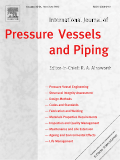
INTERNATIONAL JOURNAL OF PRESSURE VESSELS AND PIPING
Scope & Guideline
Unveiling breakthroughs in mechanics of materials.
Introduction
Aims and Scopes
- Failure Analysis and Mitigation Technologies:
Research addressing the causes and prevention of failures in pressure vessels and piping, including corrosion, fatigue, and stress corrosion cracking. - Material Characterization and Performance:
Studies that explore the mechanical properties, microstructural characteristics, and performance of materials used in pressure vessels and piping, especially under extreme conditions. - Computational Modeling and Simulation:
Development and application of numerical methods and simulations to predict the behavior of pressure vessels and piping systems under various loads and environmental conditions. - Welding and Joining Technologies:
Investigations into welding processes, joint integrity, and the effects of welding on material properties, focusing on both dissimilar and similar metal welds. - Seismic and Dynamic Response Analysis:
Research on the structural integrity and dynamic behavior of pressure vessels and piping systems subjected to seismic activities and dynamic loads. - Corrosion and Environmental Effects:
Studies examining the impact of environmental factors on the integrity of pressure vessels and piping, including corrosion mechanisms and mitigation strategies.
Trending and Emerging
- Machine Learning and AI Applications:
A notable increase in the application of machine learning and artificial intelligence to predict failures, assess material properties, and enhance the integrity management of pipelines. - Advanced Composite Materials:
Growing research interest in the utilization of composite materials for pressure vessels, focusing on their mechanical properties, durability, and performance under extreme conditions. - Integrated Integrity Management Systems:
Emerging studies on comprehensive integrity management systems that leverage data analytics and real-time monitoring to enhance the safety and reliability of pressure systems. - Sustainability and Environmental Impact:
An increasing emphasis on the sustainability of pressure vessel materials and designs, including research on eco-friendly materials and energy-efficient systems. - Hybrid and Dissimilar Welding Techniques:
A trend towards exploring hybrid and dissimilar welding techniques which are essential for improving the performance and longevity of pressure vessels in challenging environments.
Declining or Waning
- Traditional Design Methods:
There appears to be a decreasing focus on conventional design methodologies, as newer computational and machine learning approaches gain traction in the field. - Basic Material Testing:
Research centered on basic material testing methods is waning, likely due to advancements in more sophisticated, integrated testing techniques that provide comprehensive insights. - Generalized Corrosion Studies:
There is a reduced emphasis on broad studies of corrosion without specific context, as research becomes more targeted towards innovative solutions and specific material interactions. - Static Load Analysis:
The prevalence of studies focusing solely on static load analysis is declining in favor of more dynamic and complex load scenarios, reflecting the real-world application needs.
Similar Journals

JOURNAL OF MATERIALS ENGINEERING AND PERFORMANCE
Elevating Standards in Mechanical Engineering ResearchJOURNAL OF MATERIALS ENGINEERING AND PERFORMANCE, published by Springer, serves as a vital resource for researchers and professionals in the fields of materials science, mechanical engineering, and mechanics of materials. With an ISSN of 1059-9495 and E-ISSN of 1544-1024, this journal boasts a commendable track record since its inception in 1992 and is set to continue providing valuable insights until 2024. Positioned in the Q2 quartile of its categories, the journal is ranked #246 in Mechanical Engineering and #168 in Mechanics of Materials according to Scopus, reflecting its commitment to high-quality research. While currently not adopting an open access model, it remains accessible to academic professionals and students eager to advance their knowledge in the rapidly evolving domain of materials engineering. The scope encompasses innovative research focused on material performance, engineering applications, and technological advancements, making it an indispensable tool for those at the forefront of the field.

International Journal of Mechanics and Materials in Design
Transforming Ideas into Engineering ExcellenceInternational Journal of Mechanics and Materials in Design is a leading publication in the field of mechanical engineering and materials science, published by Springer Heidelberg. With an impressive impact factor, it holds esteemed rankings as Q1 in both Mechanical Engineering and Mechanics of Materials, and Q2 in Materials Science for the year 2023, solidifying its reputation as a significant contributor to the advancement of design methodologies. The journal focuses on the intersection of mechanics and materials, encouraging innovative research that addresses contemporary challenges faced in engineering disciplines. Researchers and professionals alike can benefit from accessing cutting-edge studies contributing to various applications, making it an invaluable resource for staying informed in this dynamic field. While the journal operates under a subscription model, its comprehensive reviews and high-quality original research foster a deeper understanding of material behavior and design principles, thus supporting the academic growth and professional development of its readers.
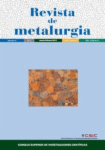
REVISTA DE METALURGIA
Fostering collaboration in the world of metallurgical science.REVISTA DE METALURGIA, published by the CONSEJO SUPERIOR INVESTIGACIONES CIENTIFICAS-CSIC in Spain, stands as a significant open-access journal since 1995 that focuses on the fields of condensed matter physics, materials chemistry, and the study of metals and alloys. With an ISSN of 0034-8570 and an E-ISSN of 1988-4222, this journal aims to disseminate innovative research findings and reviews that contribute to the understanding and advancement of metallurgical science. Although currently ranked in the fourth quartile across several relevant categories in Scopus, including Materials Science and Physics, its commitment to open access promotes the wider distribution of knowledge in these fields, ensuring that emerging findings are accessible to researchers, industry professionals, and students alike. The journal covers research from its earliest issues in 1968, maintaining a continuous archive that enhances its contributions to the scientific community. For those passionate about the complexities of material properties and behaviors, REVISTA DE METALURGIA serves as a platform for impactful scholarship and collaborative advancement.
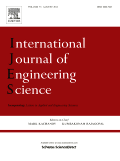
INTERNATIONAL JOURNAL OF ENGINEERING SCIENCE
Advancing the Frontiers of Engineering KnowledgeInternational Journal of Engineering Science, published by Pergamon-Elsevier Science Ltd in the United Kingdom, stands as a premier platform for pioneering research in the diverse fields of engineering and materials science. Since its inception in 1963, this journal has consistently demonstrated its commitment to advancing academic discourse, maintaining an impressive trajectory that positions it in the Q1 category across multiple engineering disciplines including Mechanical Engineering and Mechanics of Materials as of 2023. With notable Scopus rankings—placing it in the top 5% percentile for Mechanical Engineering and related fields—this journal attracts high-quality, impactful research designed for both industry practitioners and academic scholars. Although it does not currently offer Open Access options, its readership is enriched by comprehensive peer-reviewed articles, fostering a deeper understanding of complex engineering problems and innovative solutions. The International Journal of Engineering Science continues to be an invaluable resource for researchers, professionals, and students committed to pushing the boundaries of knowledge in engineering and materials science.
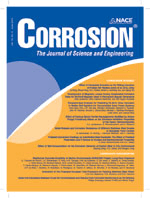
CORROSION
Elevating Standards in Corrosion Research Since 1969CORROSION is a prestigious journal published by the Natal Association of Corrosion Engineers, dedicated to advancing the understanding of corrosion phenomena in various materials across multiple industries. With a strong commitment to high-quality research, it has established itself as a key resource in the fields of Chemical Engineering, Chemistry, and Materials Science, as reflected in its Q3 ranking in the 2023 category quartiles. This journal, retaining its relevance since 1969, serves as a platform for innovative studies and findings that address fundamental and applied aspects of corrosion, vital for professionals engaged in material selection and integrity management. Through access to state-of-the-art research, CORROSION significantly contributes to the safety, sustainability, and efficiency of engineering practices worldwide. Researchers, professionals, and students alike can benefit from the insights offered by this journal, driving forward the quest for innovative solutions in corrosion management.
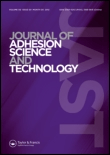
JOURNAL OF ADHESION SCIENCE AND TECHNOLOGY
Fostering Innovation in Adhesive Technologies and Practices.Journal of Adhesion Science and Technology is a distinguished publication within the fields of Chemistry, Materials Science, and Engineering, published by the reputable Taylor & Francis Ltd. Since its inception in 1987, the journal has been pivotal in advancing the understanding of adhesion mechanisms, technologies, and applications, boasting a conversion period extending to 2024. With a commendable impact factor and rankings placed in the Q2 category across various relevant domains, including Mechanics of Materials and Materials Chemistry, it offers a robust platform for scholars and practitioners alike. While currently not an open-access journal, it provides multiple access options, ensuring that vital research in adhesion science remains accessible to those dedicated to innovation and practical improvements in material interactions. This journal not only promotes empirical research but also encourages interdisciplinary collaboration, making it essential reading for researchers, industry professionals, and students eager to contribute to this dynamic field.
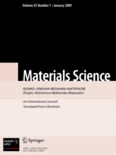
MATERIALS SCIENCE
Advancing the Frontiers of Materials Science.MATERIALS SCIENCE, a prominent journal published by SPRINGER, serves as a vital resource for researchers, professionals, and students in the fields of materials science, mechanical engineering, and condensed matter physics. With its ISSN 1068-820X and E-ISSN 1573-885X, this journal has been dedicated to sharing innovative research since its inception in 1993, and it continues to publish groundbreaking findings through 2024. Although it operates as a traditional subscription-based journal, its ranking in the Q3 quartile across multiple scientific categories, including Condensed Matter Physics, Materials Science, Mechanical Engineering, and Mechanics of Materials, signifies its relevance and impact in the academic community. Notably, its Scopus classifications reveal a competitive standing among its peers, ranking within the 25th to 33rd percentiles across various engineering and physics disciplines. The journal remains a key platform for disseminating valuable insights, fostering collaboration, and advancing the understanding of materials science.

STRENGTH OF MATERIALS
Pioneering research in the strength of materials since 1969.STRENGTH OF MATERIALS is a prestigious journal published by SPRINGER that focuses on the critical field of mechanics of materials, providing an authoritative platform for the dissemination of research and developments in material strength analysis since 1969. With an ISSN of 0039-2316 and an E-ISSN of 1573-9325, this journal serves a global audience of researchers, professionals, and students, contributing essential insights into the physical properties and performance characteristics of various materials under stress and strain. As part of the United States' academic literature, it showcases work that not only advances theoretical knowledge but also applies to practical engineering scenarios. Although ranked in the Q4 tier with respect to its category in Mechanics of Materials, with a Scopus rank of #319 out of 398 (19th percentile), it remains an important resource for those looking to expand their understanding in this specialized area. Researchers can access a wealth of information through this journal, fostering continued innovation and interdisciplinary collaboration.

Materials Physics and Mechanics
Pioneering New Horizons in Material MechanicsMaterials Physics and Mechanics is a pivotal journal dedicated to advancing the fields of condensed matter physics, materials science, mechanical engineering, and the mechanics of materials. Published by the Institute of Problems in Mechanical Engineering, Russian Academy of Sciences, this journal has established itself as a valuable resource since its inception, particularly from 2003 to 2004 and now continuously from 2009 to 2024. Although it currently holds a Q4 categorization in various disciplines, its contributions are critical to understanding and developing new materials and their applications in engineering. The journal provides insightful articles that explore the nuances of material properties, their behaviors under different conditions, and the physical principles governing these phenomena. Though it operates under a traditional publication model, the insights provided within its pages are invaluable to researchers, professionals, and students striving to push the boundaries of knowledge in the materials domain. Its ISSN numbers (1605-2730, E-ISSN 1605-8119) serve as a gateway to a wealth of scientific knowledge emanating from the Russian Federation, contributing to the global discourse in materials physics and mechanics.

Structural Integrity and Life-Integritet I Vek Konstrukcija
Pioneering Research for a Resilient Future.Structural Integrity and Life - Integritet I Vek Konstrukcija is a prominent open-access journal dedicated to advancing the fields of Civil and Structural Engineering, Mechanics of Materials, and Safety, Risk, Reliability, and Quality. Published by the SOC STRUCTURAL INTEGRITY & LIFE, this journal has been disseminating high-quality research since 2001 from its base in Belgrade, Serbia. The journal's commitment to open access ensures that vital research is freely accessible to a global audience, fostering collaboration and innovation within the academic community. With an impressive categorization in the 2023 quartiles, including Q2 in Metals and Alloys and Q3 in related fields, Structural Integrity and Life stands as a vital resource for researchers, professionals, and students striving to enhance understanding and applications in structural integrity and material performance. The journal invites contributions that address critical issues in the field, pushing the boundaries of knowledge and practical applications, and welcomes both empirical studies and theoretical discussions that can drive forward the next generation of engineering solutions.